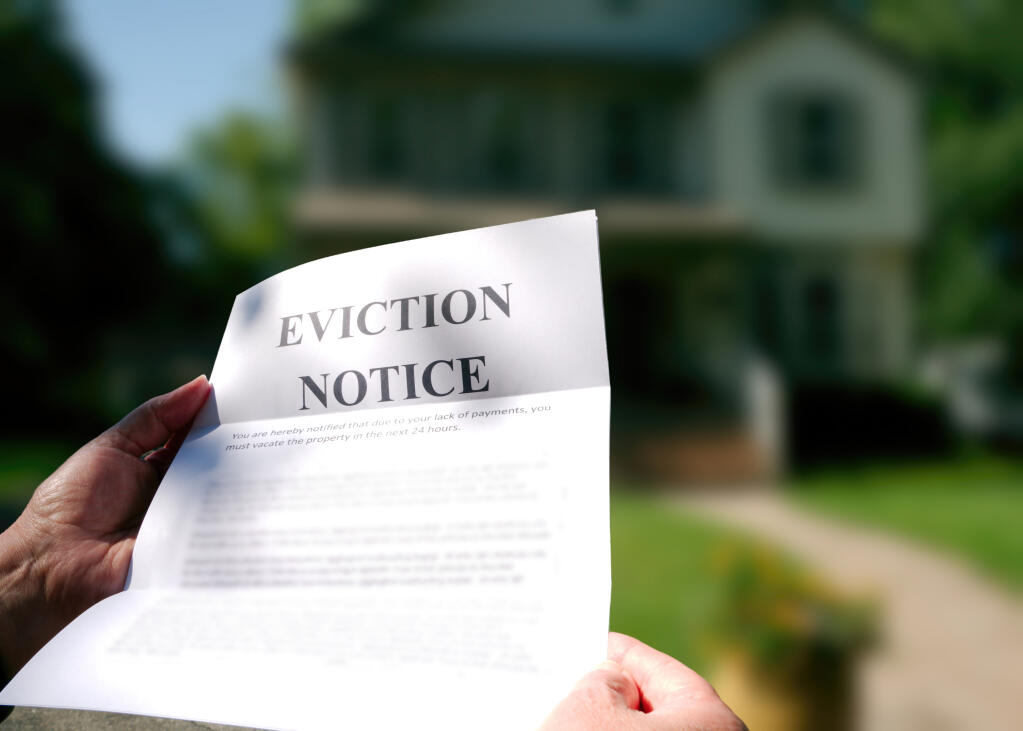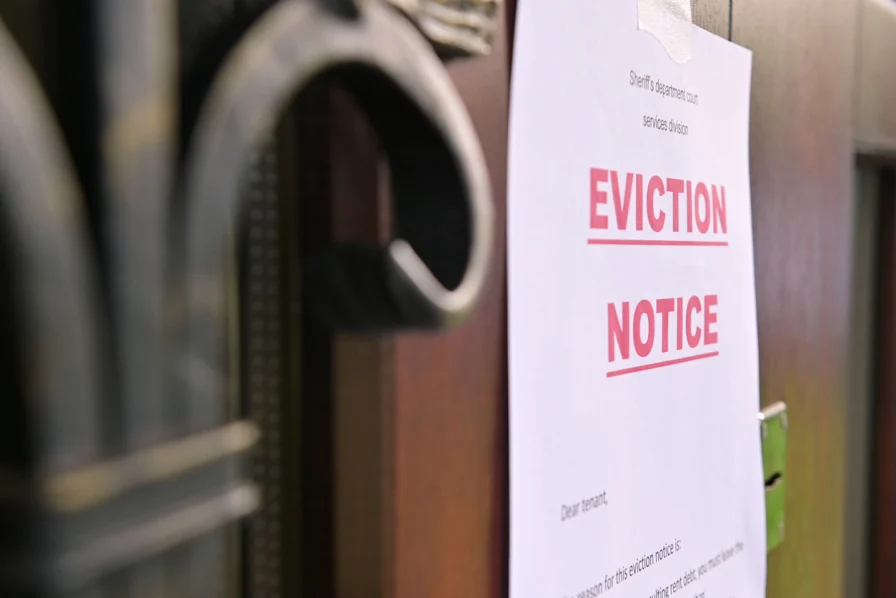Staying up-to-date with the latest eviction process in Michigan is crucial for the landlord in Michigan. Several legislative changes and ongoing discussions are shaping landlord-tenant relations, making it more important than ever to understand your rights and responsibilities.
This guide by LeaseRunner will walk you through new anti-discrimination laws and legal grounds for eviction to the precise steps for serving notice and navigating the court system, helping you protect your property and ensure compliance.
What's New in Michigan Eviction Law (2025)
The eviction process in Michigan continues to evolve, with 2025 introducing important legislative updates and proposals. Landlords must stay informed to ensure compliance and avoid issues.

The eviction process in Michigan continues to evolve, with 2025 introducing important legislative updates and proposals
1. Source-of-Income Anti-Discrimination
As of April 2, 2025, Michigan landlords with five or more rental units are prohibited from discriminating against tenant applicants based on their source of income. (According to Discrimination in Rental Housing) This means landlords cannot deny applications solely because a prospective tenant uses a Housing Choice Voucher (Section 8) or other public assistance. This is a significant change impacting initial screening and landlord policies.
2. Other Bills In Legislative or Committee Review
Several bills are under review that could further impact Michigan's eviction laws and landlord-tenant relations:
Tenant Empowerment Package (Senate Bills 372–375):
This package aims to bolster tenant protections. Key proposals include:
- Capping rental application fees.
- Requiring at least one fee-free rent payment option.
- Allowing the sealing and expungement of eviction records.
- Limiting "junk fees" beyond basic rent.
Codified Pretrial Hearings & Use of Court Magistrates (H.B. 4021):
This proposed legislation seeks to streamline the court procedure for evictions. It would require pretrial hearings in summary proceedings (Michigan's eviction lawsuits) and allow qualified district court magistrates to conduct these pretrial hearings and even trials, potentially affecting the timeline and efficiency of obtaining a judgment in unlawful detainer cases. This could lead to a more consistent and formalized initial legal procedure before a full trial.
Tenant Repair Rights, Rent-Increase Notice, & Modernization (S.B. 19–22):
This legislation focuses on tenant repair rights and transparency. Proposed changes include:
- Allowing tenants to withhold rent or perform repairs and deduct costs if landlords fail to address critical issues within specific timeframes (e.g., 48 hours for life-threatening hazards, 72 hours for mold/pests).
- Requiring longer notice periods (e.g., 90 days) for rent increases on lease renewals.
- Permitting electronic return of security deposits.
Legal Reasons to Evict a Tenant in Michigan
For a landlord to legally initiate the eviction process in Michigan, specific grounds must be established. Michigan eviction laws are clear about the circumstances under which a tenant can be removed from a rental property.

For a landlord to legally initiate the eviction process in Michigan, specific grounds must be established
Non-Payment of Rent
One of the most common and straightforward reasons for eviction is a tenant's failure to make timely rent payment. If a tenant does not pay rent by the due date, the landlord can issue a formal notice, typically a 7-day "Demand for Possession for Nonpayment of Rent." If the tenant fails to pay the overdue rent within this notice period, the landlord can then proceed with filing an eviction complaint in court.
Before signing a lease, landlords can minimize risk by running tenant eviction checks to identify applicants with a history of non-payment or prior evictions.
Lease Violations
Beyond unpaid rent, a landlord can pursue eviction if a tenant commits a significant lease violation. This includes, but is not limited to, unauthorized occupants or pets, excessive property damage which goes beyond normal wear and tear.
For such breaches, the landlord must generally provide the tenant with a "Notice to Quit" (often 30 days, depending on the nature of the violation) to allow them an opportunity to remedy the violation if it's curable. If the tenant fails to correct the issue within the specified timeframe, the landlord can then proceed with legal procedures for eviction.
Health or Safety Hazards
A tenant's actions that create a severe health or safety hazard on the rental property can also be grounds for eviction. This might include unsanitary conditions, hoarding, or other actions that pose a risk to the property or other residents. Similar to other lease violations, a landlord typically must provide notice (often a 7-day "Notice to Quit") for the tenant to rectify the hazardous condition before initiating court procedure.
Criminal Activity or Threats
Engaging in illegal drug activity or committing other criminal acts on the rental property, or making credible threats of physical violence against the landlord, other tenants, or property, are serious grounds for eviction.
Michigan eviction laws often allow for a much shorter notice period for these severe violations, sometimes as little as 24 hours, due to the immediate risk posed. The landlord will need strong evidence to support such claims in court.
Staying After Lease Ends
When a lease agreement expires, and the tenant remains on the rental property without the landlord's permission, they become a “holdover tenant."
In such cases, the landlord can initiate the eviction process in Michigan to regain possession. The required notice period for a holdover tenant typically depends on the frequency of rent payment (e.g., 30 days for a month-to-month tenancy). The landlord's rights to regain their property after a lease term ends are clearly defined under Michigan eviction laws.
Proper Steps to Serve an Eviction Notice in Michigan
Serving an eviction notice is the crucial first step in the eviction process in Michigan. It's a formal communication from the landlord to the tenant indicating a breach of the lease or tenancy agreement and the intent to regain possession of the rental property.

Serving an eviction notice is the critical first step in the eviction process in Michigan:
Step 1. Choose the right notice type
Michigan law specifies different types of eviction notices based on the reason for eviction. Selecting the correct notice is paramount:
- 7-Day Notice to Quit (Demand for Possession for Nonpayment of Rent): Used when a tenant fails to pay rent.
- 7-Day Notice to Quit (for Health/Safety Hazards or Illegal Activity): Used for serious issues like creating a health hazard or engaging in illegal activity on the rental property. If an incident involving illegal drugs occurs, landlords should immediately inform the police and file an official report. The tenant will then be served with a 24-hour notice to vacate the property.
- 30-Day Notice to Quit: Generally used for other lease violations that are curable (e.g., unauthorized pets, minor property damage) or when a lease term ends and the tenant remains without permission (holdover).
Step 2. Include required details
Regardless of the type, every eviction notice must contain specific, accurate information to be legally valid. This typically includes:
- The full name(s) of the tenant(s).
- The complete address and description of the rental property.
- The specific reason for the eviction (e.g., exact amount of unpaid rent, detailed description of the lease violation).
- The date the notice is issued.
- The deadline by which the tenant must comply (pay rent, fix the violation, or vacate).
- A statement that failure to comply will result in legal action to regain possession.
- The landlord's signature and contact information.
Step 3. Deliver properly
Michigan eviction laws outline the acceptable methods for ensuring that the tenant receives formal notification. Common methods include:
- Personal Service: Handing the notice directly to the tenant.
- Substituted Service: Leaving the notice with a member of the tenant's family or a responsible adult at the rental property and requesting they deliver it to the tenant.
- First-Class Mail: Sending the notice via regular mail. While permissible, it's often advisable to combine this with another method for proof of delivery.
- Electronic Service (if agreed upon): If the tenant has explicitly agreed in writing to receive notices electronically (e.g., via email), this method may be used, provided the agreement and confirmation protocols are followed.
The landlord must keep a copy of the served notice and proof of service, as this documentation will be required if the case proceeds to court.
Step 4. Avoid self-help
Under no circumstances should a landlord attempt “self-help" eviction. This means a landlord cannot physically remove a tenant, change locks, shut off utilities, remove the tenant's belongings, or otherwise attempt to force a tenant out without a court order.
Such actions are illegal under Michigan tenant protections and can result in severe penalties for the landlord, including fines and damages payable to the tenant. The only legal way to remove a tenant who refuses to vacate is through the formal eviction process in Michigan via a court order and the involvement of law enforcement.
Step-by-Step Eviction Process in Michigan
Once the proper notice has been served and the tenant fails to comply, the formal eviction process in Michigan begins. This process follows strict legal procedures, and each step must be completed before a landlord can legally regain possession of their rental property.
Step 1 – Serve the Legal Notice
The eviction process starts when the landlord serves the appropriate notice to the tenant, such as a 7-Day Notice for nonpayment or a 30-Day Notice to terminate tenancy. This step ensures compliance with Michigan eviction laws and gives the tenant a chance to fix the issue or vacate.
Step 2 – File a Complaint
If the tenant doesn’t resolve the issue or leave, the landlord must file a Complaint and Summons with the local district court. This begins the formal unlawful detainer case. Filing fees apply, and landlords should attach a copy of the notice served and the lease agreement, if available.
Step 3 – Court Serves Tenant
The court arranges to have the tenant officially served with the Complaint and Summons, usually through a process server or sheriff’s deputy. The tenant will then receive a hearing date and details about their tenant rights, including the option to respond or seek legal aid.
Step 4 – Tenant May Respond or Appear in Court
The tenant can choose to respond in writing or appear at the court hearing to defend against the eviction. Common defenses may include improper notice, violation of tenant protections, or disputes over rent payment or lease violations.
Step 5 – Court Issues Judgment and Writ
If the court sides with the landlord, it issues a judgment for possession. In most cases, the tenant is given 10 days to move out voluntarily. If they do not, the court will issue a Writ of Eviction, authorizing the sheriff to remove them from the property.
Step 6 – Sheriff Conducts the Eviction
The final step is carried out by the sheriff, who enforces the Writ of Eviction. The landlord regains possession of the unit, but cannot take any personal action to remove the tenant. This protects both landlord rights and tenant rights during the process.
Timeline & Cost of Eviction in Michigan
The eviction process in Michigan involves both time and financial commitments from a landlord. While an uncontested eviction can be relatively quick, any disputes from the tenant can significantly extend the timeline and increase costs.

While an uncontested eviction can be relatively quick, any disputes from the tenant can significantly extend the timeline and increase costs
Important Documents Landlords Should Keep
Keeping thorough records is one of the best ways for landlords to protect themselves throughout the eviction process in Michigan. Proper documentation helps support your case in court, especially if the tenant contests the eviction or requests legal aid.
1. The Lease Agreement (and all its attachments)
This is the bedrock of your landlord-tenant relationship. It legally outlines rent amounts, due dates, lease terms, tenant and landlord responsibilities, pet policies, late fees, and more.
What to keep: The original signed lease agreement from all parties. Don't forget any addendums, amendments, or lease renewals. Every specific detail agreed upon should be in writing and attached.
2. Rental Applications & Tenant Screening Records
These documents contain the initial information about your tenants, including their credit history, criminal background checks, eviction history, references, and proof of income. They're critical for proving fair housing compliance and can be essential in disputes over tenant truthfulness.
What to keep: All received applications (even those denied), credit reports, background checks, employment and income verification, and detailed notes from reference calls.
3. Security Deposit Records
Michigan has strict laws regarding security deposits. You need clear documentation to prove compliance.
What to keep:
- Receipts acknowledging the security deposit payment.
- Written notice of the financial institution where the deposit is held (must be sent to the tenant within 14 days of receipt).
- The Move-in/Move-out Checklist.
- The letter requesting the tenant's forwarding address and the itemized list of deductions from the security deposit (must be sent within 30 days after the tenant moves out).
- Proof of mailing these notices.
4. Move-in/Move-out Checklist (Inventory Checklist)
This is your primary evidence for the property's condition before and after a tenant's occupancy. It's indispensable when disputing security deposit deductions for damages.
What to keep: The original signed checklist by both landlord and tenant at move-in and move-out. Supplement with detailed photos or videos showing the property's condition at both times. It's also helpful to understand what qualifies as normal wear and tear versus damage when documenting repair needs or security deposit deductions.
5. Rent Payment Records
Crucial for tracking payment history, including full payments, partial payments, and any outstanding balances. Essential for non-payment of rent eviction cases.
What to keep: A detailed rent ledger, receipts for any cash payments, and notes on payment dates and methods.
6. Tenant Correspondence Records
Any significant communication with your tenant can become evidence in a dispute.
What to keep: Copies of all emails, letters, important text messages (if relevant to key issues), and detailed notes from phone calls (date, time, content, parties involved). Pay special attention to communications regarding repair requests, lease violations, or notices served.
7. Maintenance and Repair Records
Demonstrates that you've fulfilled your landlord obligations for property upkeep and responded to tenant repair requests. Also useful for claiming deductions on your taxes or proving tenant-caused damages.
What to keep: Receipts for repair services, invoices for materials, descriptions of work performed, completion dates, and communication related to repair requests.
Find out: Property Maintenance in Michigan: Landlord & Tenant Responsibilities
8. Eviction Notices & Court Records
If you've had to evict a tenant, these documents serve as proof that you followed the proper legal process.
What to keep: Copies of all Notice to Quit/Demand for Possession, proof of service, filed complaints, summonses, court judgments, and Writs of Restitution.
Tips to Avoid Costly Eviction Mistakes in Michigan
Even minor errors during the eviction process in Michigan can delay your case or result in dismissal. To protect your landlord rights and ensure a smooth process, keep these practical tips in mind.

For landlords, understanding and proactively avoiding common mistakes is crucial for protecting their landlord rights
1. Use the Correct Eviction Notice
Make sure you’re serving the right notice type based on the situation—nonpayment, lease violation, or end of lease. Using the wrong form can invalidate your case.
2. Document Everything
From rent payment logs to communication records, keep thorough documentation. It strengthens your case if the tenant challenges the eviction or seeks legal aid.
3. Follow Proper Delivery Methods
Notices must be delivered in a legally acceptable way—hand delivery, mail, or posting. Improper service is a common reason eviction cases get thrown out.
4. Never Attempt Self-Help Eviction
Locking out a tenant, shutting off utilities, or removing belongings without a court order violates tenant rights and may lead to legal penalties.
5. Act Promptly
If a tenant falls behind on rent or violates the lease, don’t delay. Timely action can prevent deeper financial loss and speeds up the unlawful detainer process if needed.
6. Be Professional and Respectful
Maintain a respectful tone in all communication. Emotional or aggressive behavior may be used against you in court.
7. Understand Your Legal Boundaries
Familiarize yourself with Michigan’s landlord-tenant laws, especially any new changes in 2025. Staying compliant helps protect your landlord rights.
8. Consult an Attorney When Needed
If the situation becomes complicated—such as contested evictions or fair housing issues—seek legal guidance. It may save time and money in the long run.
Conclusion
The eviction process in Michigan in 2025 brings new responsibilities and evolving legal standards for landlords. With updated protections for tenants and a greater emphasis on due process, it's more important than ever to follow each step carefully—from serving notices correctly to preparing court documentation.
LeaseRunner offers expert guidance on Michigan tenant laws and helps you handle evictions efficiently. By understanding your rights, staying organized, and acting within the law, you can handle evictions legally and efficiently while avoiding costly mistakes.
FAQs
1. How long does the eviction process in Michigan typically take?
Most evictions take between 4 to 8 weeks, depending on whether the tenant contests the case or seeks legal aid. Delays may occur due to court backlogs or improper documentation.
2. Can a landlord evict a tenant without a lease in Michigan?
Yes, even without a written lease, landlords can evict tenants under a month-to-month arrangement by serving a 30-Day Notice. All legal procedures must still be followed.
3. What if the tenant refuses to leave after the court judgment?
If a tenant stays past the court’s judgment, the landlord can request a Writ of Eviction, which authorizes the sheriff to remove the tenant.
4. How much does it cost to evict a tenant in Michigan?
The cost of the eviction process in Michigan varies but typically ranges from $150 to $5,000 for an uncontested eviction (including filing fees, service fees, and basic legal costs).
5. Do tenants have access to legal aid during eviction?
Yes. Tenants can request legal assistance, which may slow down the process if a hearing is needed. Landlords should be prepared with full documentation.



